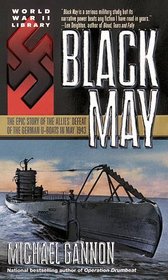Helpful Score: 2
The invasion of Europe wasn't going to happen until we won another battle---the Battle of the Atlantic. This sea battle lasted for six years and cost thousands of lives and untold millions of dollars. And this doesn't count all the money, fuel, steel, men and time that went into getting ships safely across---either way.
Many factors joined together to win this battle: advances in sonar and radar, development and refinement of sub-killing tactics, the use of escort carriers, better torpedoes and depth charges, breaking the Ultra code, speeding production of ships to replace those lost, and more. But probably the most important was overcoming the stupid prejudices and misconceptions of some of our senior naval officers. And that doesn't even count how lucky we were that the Germans didn't have all the U-boats they wanted at the beginning of the conflict.
While convoys only lost about 7% of the total number of shipping that crossed back and forth during the war, this still hurt. Imagine if we didn't know where the subs were waiting (thanks to Enigma). Unlike in the Pacific, where the Japanese lost tens of thousands of troops to drowning when their transports were sunk, the Allies were pretty lucky in the Atlantic.
To understand how close we came to losing this war with much heavier losses, read Gannon's "Operation Drumbeat" before reading "Black May." However, either can be read on its own or in reverse order.
Many factors joined together to win this battle: advances in sonar and radar, development and refinement of sub-killing tactics, the use of escort carriers, better torpedoes and depth charges, breaking the Ultra code, speeding production of ships to replace those lost, and more. But probably the most important was overcoming the stupid prejudices and misconceptions of some of our senior naval officers. And that doesn't even count how lucky we were that the Germans didn't have all the U-boats they wanted at the beginning of the conflict.
While convoys only lost about 7% of the total number of shipping that crossed back and forth during the war, this still hurt. Imagine if we didn't know where the subs were waiting (thanks to Enigma). Unlike in the Pacific, where the Japanese lost tens of thousands of troops to drowning when their transports were sunk, the Allies were pretty lucky in the Atlantic.
To understand how close we came to losing this war with much heavier losses, read Gannon's "Operation Drumbeat" before reading "Black May." However, either can be read on its own or in reverse order.
Helpful Score: 1
The Battle of the Atlantic has been a hobby of mine for a long time. I've read countless books about it, all addressed to amateur geezer historians like myself. And been happy with them. Then along comes "Black May" by Michael Gannon and blows all predecessors out of the water.
"Black May" by Michael Gannon is the most accomplished, most entirely thought through and well-expressed history of the Battle of the Atlantic ever written, and I've been reading them for over forty years. In the future it will always be the "gold standard" history of that years-long struggle. No serious amateur of WWII history can afford to ignore this work.
Gannon knows perfectly well what he's doing. An experienced historian at the University of Florida, his command of all details puts to shame other wannabe attempts to describe the war between U-boats, merchant shipping and the Anglo-American navies. Nor is his effort merely a droning, dry, academic treatment. Just as he wipes the board when it comes to factual detail and accuracy, his ability to narrate the continuing struggle in an intelligently dramatic manner (void of all histrionics) combines to form what must be the single best treatment of this necessarily fundamental sub-conflict of WWII. Read it. You'll never regret it.
"Black May" by Michael Gannon is the most accomplished, most entirely thought through and well-expressed history of the Battle of the Atlantic ever written, and I've been reading them for over forty years. In the future it will always be the "gold standard" history of that years-long struggle. No serious amateur of WWII history can afford to ignore this work.
Gannon knows perfectly well what he's doing. An experienced historian at the University of Florida, his command of all details puts to shame other wannabe attempts to describe the war between U-boats, merchant shipping and the Anglo-American navies. Nor is his effort merely a droning, dry, academic treatment. Just as he wipes the board when it comes to factual detail and accuracy, his ability to narrate the continuing struggle in an intelligently dramatic manner (void of all histrionics) combines to form what must be the single best treatment of this necessarily fundamental sub-conflict of WWII. Read it. You'll never regret it.




